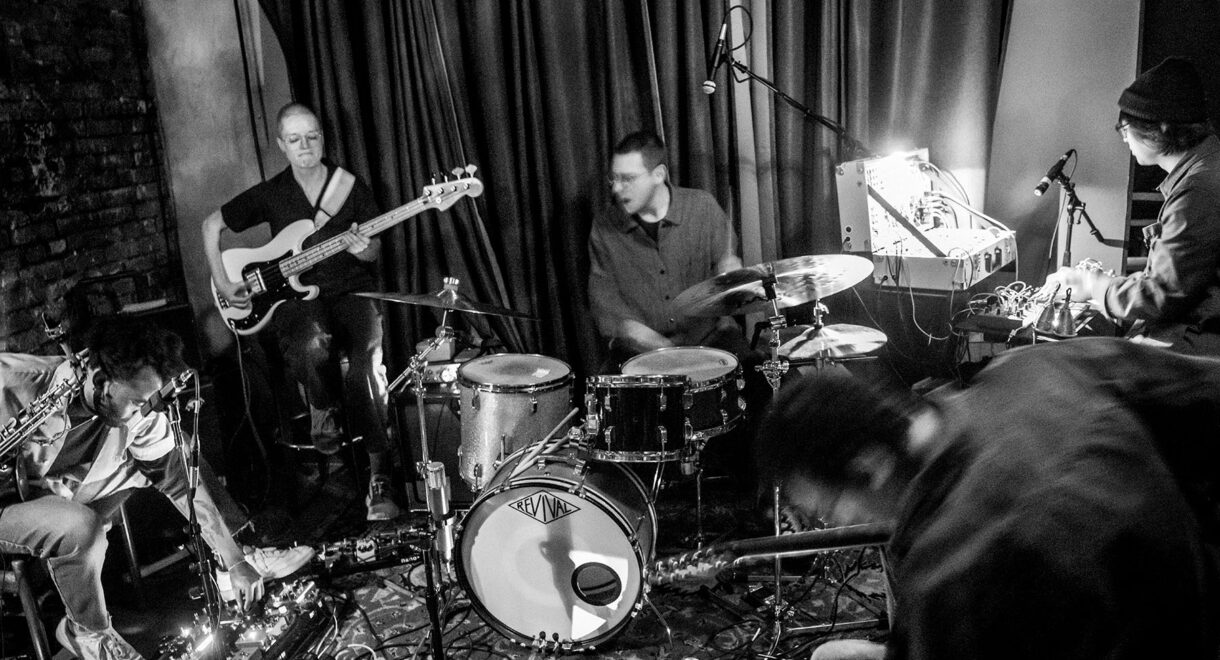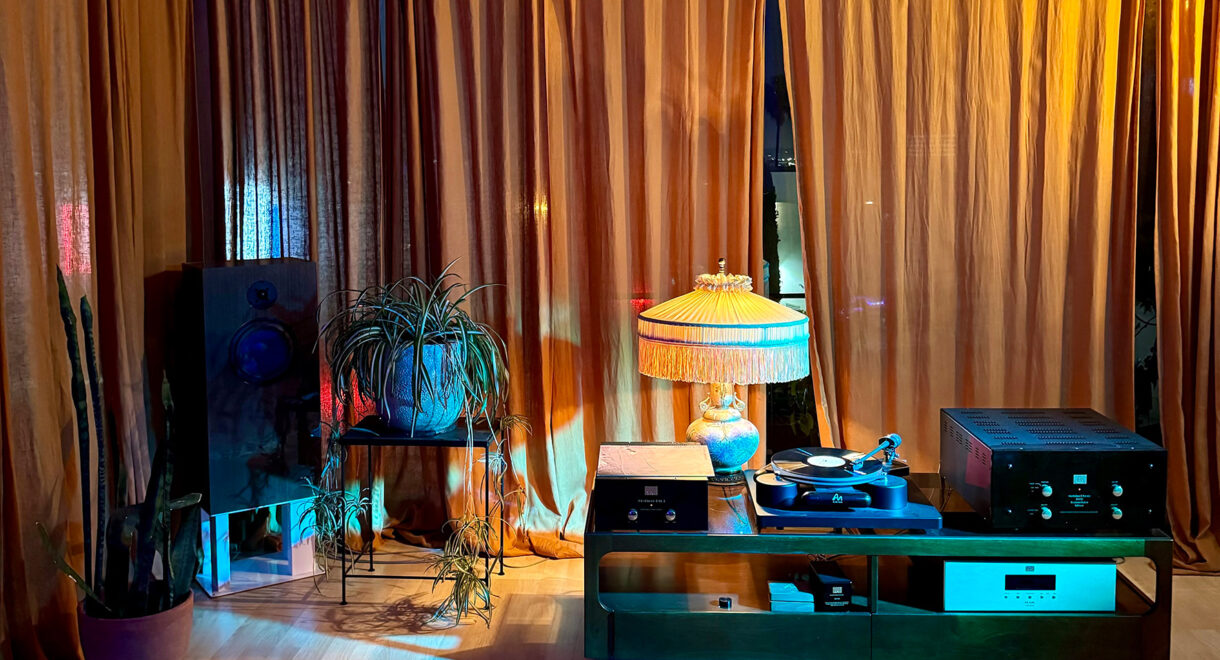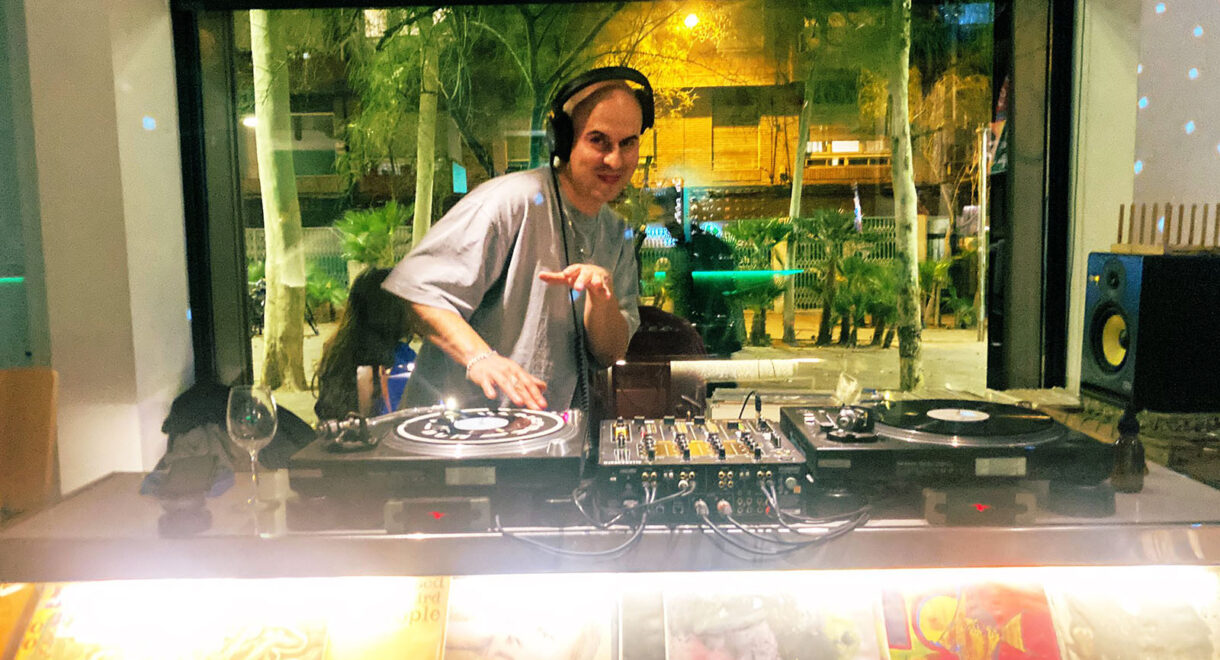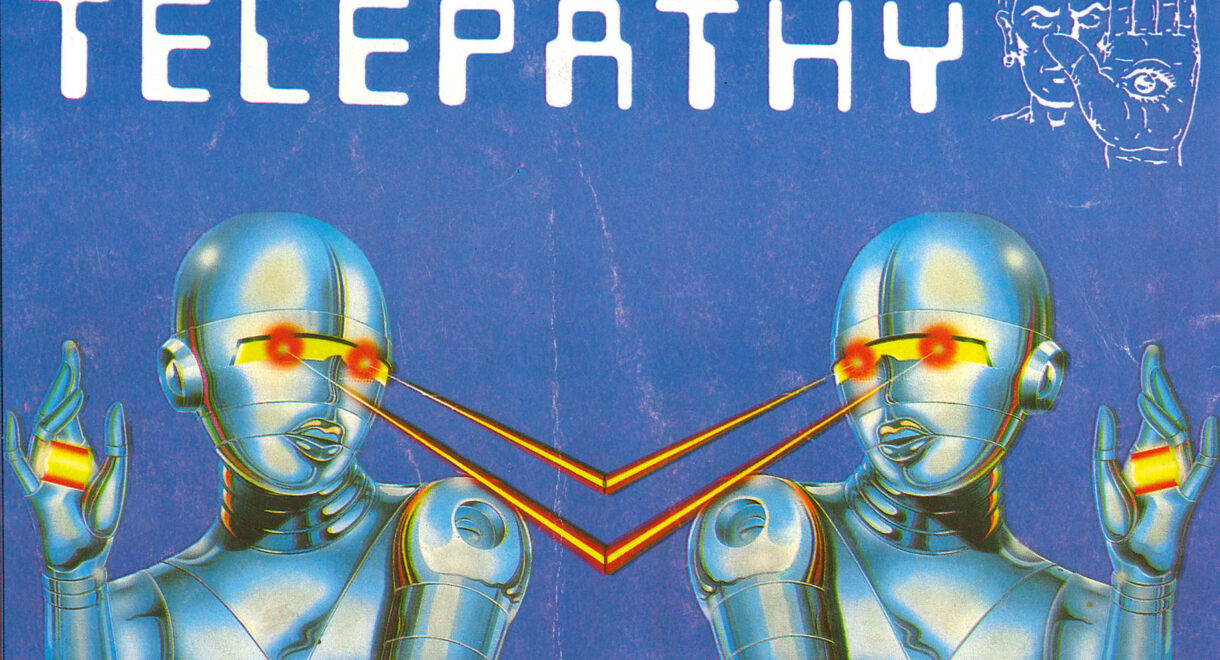In conversation with Small Medium Large, a new quintet from the burgeoning new West Coast jazz & improvised music scene. In 2018, LA-based jazz and post-rock guitarist Jeff […]
In Conversation: Baba Stiltz in Los Angeles

Swedish-Filipino-American artist Baba Stiltz talks growing up, Vacaville, and his favorite things to do in Los Angeles.
I first met Baba Stiltz back in 2016 when he was in town DJ-ing a friend’s party in downtown Los Angeles. Back then, Baba was most-known for his playful, pop-infused dance tracks for Stockholm-based label and collective Studio Barnhus. Featuring auto-tuned vocals and peculiar production, Baba’s music was often described as having a “trickster” quality to it, but there always seemed to be something bubbling underneath the surface of his cleverly produced, shape-shifting dance tracks. I learned later on that Baba played guitar and actually started his musical career as a singer-songwriter.
From 2016 onwards, Baba would make his way back to Los Angeles just about every year. Each time we connected, I’d learn a little more about his unique background and story. Born in Stockholm, Baba spent his childhood in both Sweden and Northern California. His dad’s side of the family is Filipino. He wrote his first song when he was in kindergarten, studied ballet with the Royal Swedish Opera House, and released his first album when he was just 16 years old. He makes a mean Filipino chicken adobo.
In recent years, Baba has turned back the pages to tell his story one 12-bar blues at a time. Earlier this year, he released Paid Testimony, a collection of indie rock and country-folk songs that reflect on his time spent on the West Coast in Los Angeles and with his family in Vacaville, California. Armed with just a guitar, microphone, and some pedals, Paid Testimony is Baba at his most honest and vulnerable.
From the liner notes of Paid Testimony written by Matt McDermott:
“In recent years, Stiltz has made like Lee Hazelwood’s Cowboy In Sweden in reverse, making annual pilgrimages from Stockholm to California and reconnecting with his roots via a guitar and a Fostex 4-track. He‘s drawn to the less glamorous corners of the golden state, an observant habitué of unkempt streets and dive bars stretching from LA to Vacaville. It’s a long stretch from the jetset techno clubs where Baba originally plied his musical trade, but it’s where he finds characters and ideas worth writing about.”
Today, Baba released the second edition of his In L.A. tape series featuring post-rock guitar experiments reminiscent of English avant-garde guitarist Derek Bailey and American Primitive music à la John Fahey. Listen to previews below:
In L.A. 2 is available on tape only exclusively through our online shop: https://insheepsclothinghifi.com/product/baba-stiltz-in-la-2-cs/
To celebrate the release of Paid Testimony and In L.A. 2, I caught up with Baba over Zoom to share stories about his upbringing, hanging out with Randy in Vacaville, favorite LA restaurants, guitar heroes, and more!
Congrats on the new album, we all love it. The liner notes for Paid Testimony include some details about your background that you hadn't shared before. I’d love to start there. You grew up in both America and Sweden?
I was born in Stockholm. I was here for a bit, and then my dad got into some shit and was locked up for four years. When he got out of prison, my mom asked him to take me so we went to America and I spent a few years in California with my dad’s side of the family. Then one day, my mom suddenly showed up at my kindergarten and was like, “Hey Baba, you want to go back to Sweden?” and I was like, “Okay, sure.” That was a whole thing… So we went back to Stockholm and I spent my whole life there basically up until I was around twelve. I then started to visit my family in the States every few years whenever I could get my money up.
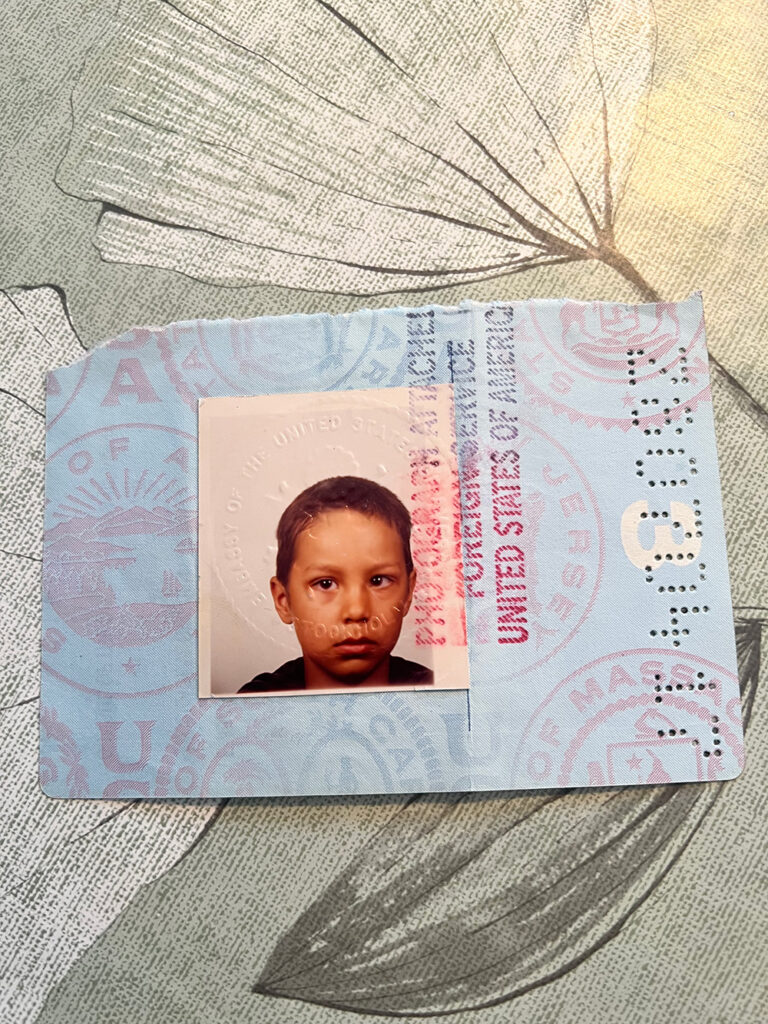
It was important to me to stay connected to that side of my family because such a huge part of me is culturally American. I’d say I’m more inclined toward American ways of socializing. It’s very different in Scandinavia, so I always felt kind of outside of how things worked here. Culturally, I feel kind of split in many ways. I’m also very much Swedish. I come from a pretty culturally inclined family with books and movies, so having that European sensibility has definitely helped me out.
With this record, I think I’ve reached a point with music where it’s become so important to me to be as close to it as possible. I want to shed all assumptions of what music is to me and to other people and try to convey what is in the moment when I’m trying to do something. Bob Dylan once talked about the recording process. He said it’s not about the production or the recording, it’s about the moment captured. That kind of rings true to me. I’ve been through the wringer with music – I’ve been doing it for most of my life. I just realized that for it to make sense, it kind of needs to be me. You know what I mean? So it’s kind of a crazy record to put out, but I don’t know, it felt like the right thing to do.
“I feel like with music now there are so many points that have been super commodified to this degree where we all interact with it as wallpaper, a setting, or an aesthetic more than an art form.”
I think that definitely comes across. The music feels completely honest and personal.
When I’ve been playing these songs at shows for the first time, there’s nothing for me to hide behind. It’s just me and a guitar and all that that kind of entails. People have their assumptions of what you’re supposed to do when you get up on stage with a guitar. Believe me, I totally get that, but that forces me to have to deal with the situation myself. It’s been really cool to see people connect with that. This one girl saw me in Tokyo and messaged me, “I saw your show and it was really painful, but I couldn’t stop being there and listening and looking at you.” Maybe it’s kind of a shitty response, but I wrote to her, “It sounds like you had a real experience.” People laugh nervously at some of the lyrics. The humor is there, but it’s underpinned by me being completely honest about what’s going on and how I’m approaching this. Seeing the multiplicity of that experience feels more real than anything has felt in a long time.
I feel like with music now there are so many points that have been super commodified to this degree where we all interact with it as wallpaper, a setting, or an aesthetic more than an art form. Believe me, I like entertainment too, but music should be taken seriously. As an artist, I want to interact with music in a pretty deep way. For a while, I felt like I was slipping away from that. I have a responsibility as someone who makes music to kind of be like, “Okay, well, fucking put your money where your mouth is and do something about it.”
Going back to your early days, your dad taught you how to play guitar. Was that in California?
No, that was after the whole thing with my family. After my mom took me back to Sweden, my dad worked a mattress factory job to save money to come back to Stockholm. He didn’t know what had happened. He showed up at school and they were like his mom took him… So, yeah, shit was super fucked up. My dad had no money. He was working this pretty hectic job and saved up. I was walking down the street with my mom one day in Stockholm. I saw my dad, and I just lost it. He just showed up out of nowhere. Then this whole custody thing started. I was living with my dad on and off throughout my childhood. In Stockholm, he was staying in this crummy-ass basement situation in a pretty sketchy neighborhood. It was this whole thing, but he’d always be playing guitar. I remember I was playing NHL ‘98 on my dad’s tower computer. He’d had a few beers and was playing guitar. It looked so fun.
By the time I was eight years old, I was over video games and I just turned around and was like, “Can you teach me how to play guitar?” He was not stoked about that at all because my uncle used to be in the music industry and my dad had also done a few things. He was like, “Learn math or programming or some shit,” but I was super persistent. So finally he said, “Okay, if you can learn this song tonight, I’ll buy you a guitar tomorrow.” The song he wanted me to learn was super easy. It was “Dust My Broom” by Elmore James. It’s like an open D slide guitar thing, basic 12-bar blues. So I learned to play that song and then like a week later, he got me a guitar off of some friend of his. It was a small bodied, nylon string classical guitar. From then on, I was playing guitar every day.
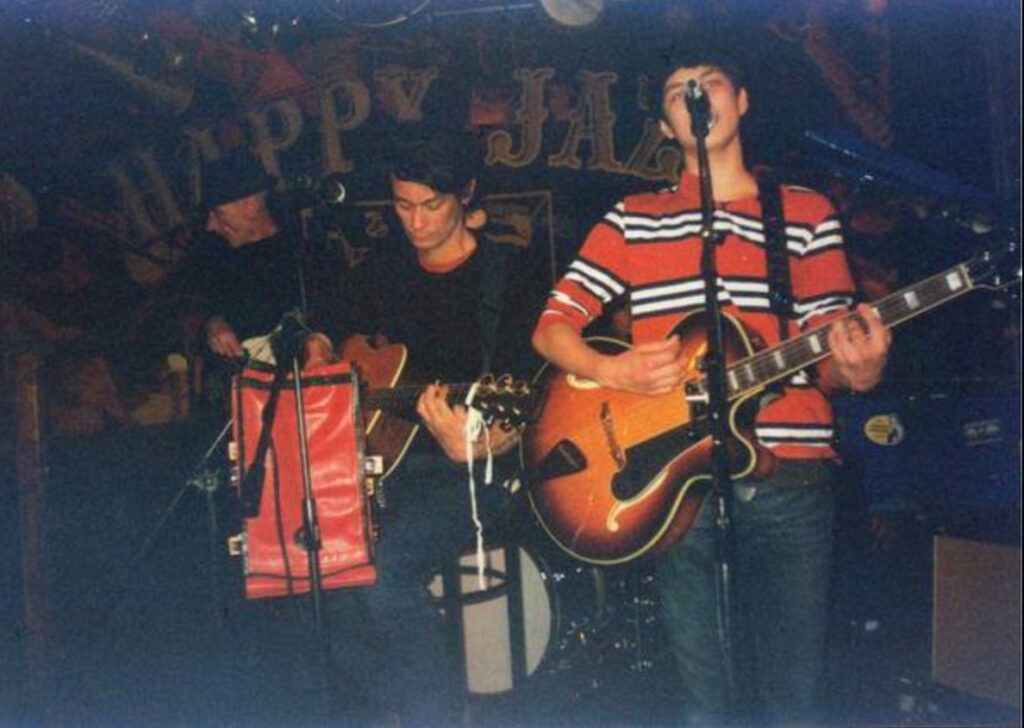
My dad has introduced me to a lot of pretty cool music from a very young age. He introduced me to John Fahey around that time. I was completely enamored by that music, because it was something different. This was long before I got into electronic music, so the idea of minimalism and sequencing was presented to me in a very different way because it came through guitar. That allowed me to approach music differently than maybe my peers that I grew up with in Stockholm, who were also into music. I think that’s one part of me that’s always been around. Even within the context of dance music, I would figure stuff out on the guitar and then transpose it into the dance music world. I’d also sample my guitar playing. A lot of my songs have weird guitars in it that you wouldn’t hear because it’s processed. Now, I’m just showcasing it.
What are some of your dad’s favorite tunes to play on guitar?
As a joke he’d play “Bankrobber” by The Clash. “Poor Boy a Long Way from Home” by John Fahey. “Mojo Hand” by Lightnin’ Hopkins. “Leave My Wife” by John Lee Hooker. Out of all the dudes, John Lee Hooker was the guy. When I first heard him, I was like, “This guy’s the shit. He’s doing it for real.” Nothing against all the other guys, but yeah, my dad would play that. He was super into reggae and dub, so he put me on to “Croaking Lizard” by The Upsetters. He put me on to all the early Lee Perry stuff, all the Trojan shit. He was heavily influenced by all that.
He lived in Brixton back in the ‘80s, so that was a big part of his story. I remember this one specific song, “Girl God” by Redd Kross. That was another big tune for dad. But he played everything. My dad is such a polyglot when it comes to music. He just really loves music. Some people say that when you pass a certain age, your interest for music kind of dies out, but my dad’s like a fucking teenager when it comes to music!
Then my mom put me on to a lot of European music. She showed me Nick Drake. She’s big into classical music. She’d play the Glenn Gould Bach Variations. She’d play Mahler, Schoenberg, and all that. Then, of course, the European electronic stuff. She was a young kid in the ‘90s when I was growing up so she’d listen to Moon Safari by Air. That’s still one of my top records of all time. My parents have had a huge influence on me musically.
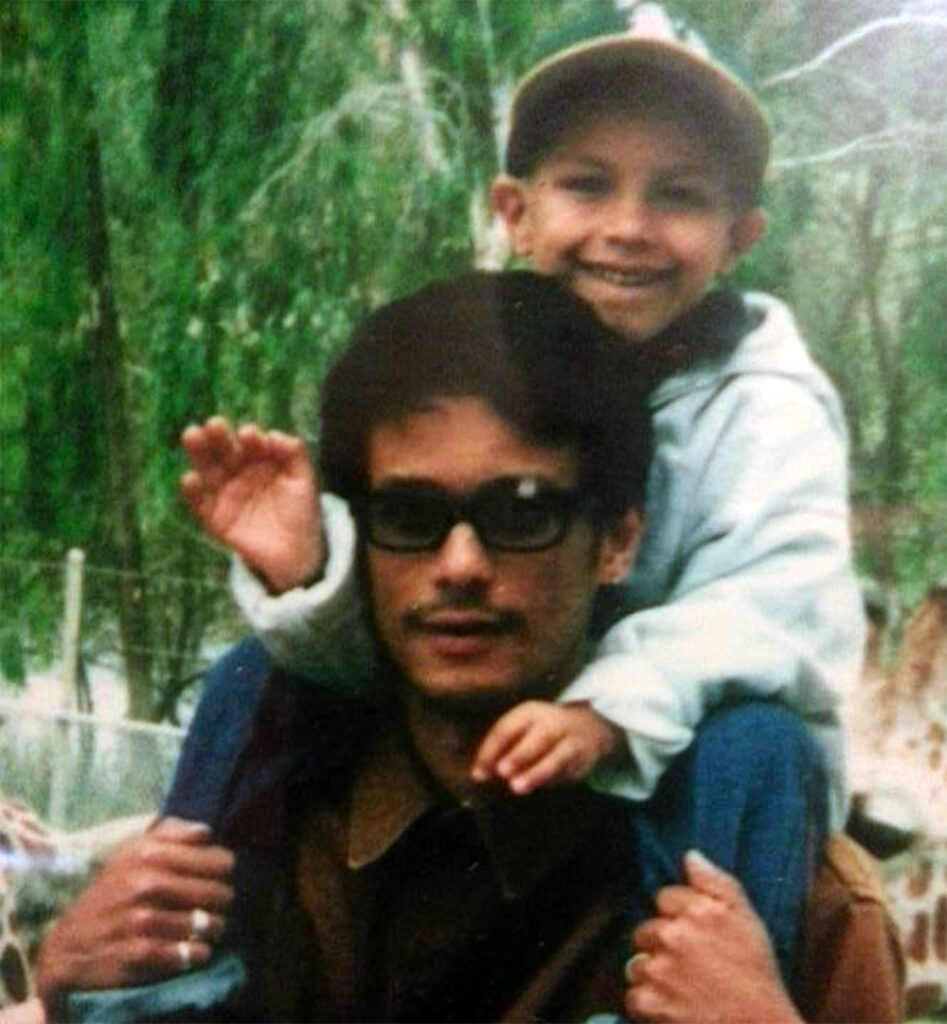
I’d love to know more about Vacaville, California, where your dad and your Filipino side of the family live. You’ve been going there every year now for the past few years. It seems like those trips there have been incredibly inspiring for your latest work.
I think traveling is helpful in opening up different parts of your brain, and then you can get a new context when you’re out of it. For me, it’s very strange because Vacaville is the only place that has stayed the same throughout my life. In Stockholm, we moved around a crazy amount when I was a kid. I’ve never really had a constant home, but Vacaville, where my Lola and my uncle are, has always stayed the same. So it very much feels like home when I go back there. It’s also very different now though. I remember when I was growing up in the ‘90s, it was like heaven on earth. It was like a perfect suburbia: Nickelodeon, Cat Dog, Lucky Charms, happy people had money, you could go to the mall and hang out. Then when I went back there when I was twelve, in 2008, shit was really messed up and it was not chill, like rednecks and racist people. I don’t know if you’ve been, but Northern California can get weird when you go north. Vacaville is just a working class town, but now it’s getting all boujee’d up. All these techies are moving in from San Francisco. They’re building weird gated communities and these neoclassical style homes. A lot of things are changing, but I don’t know, when I’m in Vacaville, I guess I kind of reconnect with where I come from. That in itself can be inspiring.
“I feel like LA is such a vortex of weirdness. There’s a lot of dark shit out in LA, but it’s so weird… It has always been about the unreal and the dream of it. There’s something cool about that to me.”
You mentioned learning how to cook from spending time with your lola (grandma). What are some of those dishes?
The first time I really paid attention to my lola’s chicken adobo, my mind was blown because she had a huge thing of vinegar. She had a fairly decent sized pot, but she was just pouring the whole thing of vinegar into it. I remember being like, “Whoa, holy shit, that’s crazy.” Then when I tasted it, I was like, “Well, this tastes exactly like it should taste!” Also, her Sinigang na Monggo, which is like a Filipino lentil stew with soup and chicharon. Her bangus (fried milkfish). Mainly the staples. She used to get so annoyed when I would try to cook, but now that she’s old, she’ll allow it. It’s under supervision, of course, but she’ll allow me to kind of take the reins and try to figure it out.
Moving on to the tape, this is the second edition of your In LA tape series. What is it about Los Angeles that draws you here year after year?
I mean, it’s the usual stuff – my friends, the weather, etc. I feel like LA is such a vortex of weirdness. There’s a lot of dark shit out in LA, but it’s so weird. I remember the first time I went out there, I stayed at my friend Alex’s place and he’s like, “Oh yeah, I got these two very old Chinese roommates.” We’re with all these idiot hip kids hanging out listening to records, and then you go into the kitchen and there’s like a fridge that’s chained up… To me, that would never happen anywhere else. LA feels like a city that allows itself to be itself. I feel like, in comparison, New York has very much been commodified. To find some real stuff, you have to go outside of it, whereas LA has always been fake. It has always been about the unreal and the dream of it. There’s something cool about that to me.
What are some of your favorite things to do in your downtime in LA?
Not to condone drinking or anything, but I think LA has a few of the coolest bars around. I like hanging out at Jay Dee’s in Alhambra. I like going to bookstores in LA. There are a lot of cool readings in LA because everyone’s a writer, so the prestige is not really there. Even if you’re the coolest, most awarded writer, you’re probably still writing copy for FX’s Instagram… You know what I mean? So you can go and catch these amazing people. You’ll have five people in the audience, and it’s amazing. I like going to the movies… I don’t know. There’s a huge amount of stuff to do. Eating food is probably top tier. The food out in LA is unbeatable, I’d say.
That was my next question actually. Your personal Instagram is all food pics. What are a few of your favorite spots in LA?
I’ll be a lame ass normie and say Mariscos Jaliscos because I remember the first time my friend Alex took me there, we just had like a huge food fest. It was amazing. The food there has been on point ever since that time. It doesn’t get worse. The quality of food just stays the same. Regardless of the accolades and how many people know about it, it’s still just good ass food. Also, everything I’ve had in the San Gabriel Valley has been good. I’ve never had a bad meal there. Basically, if I want to go eat, I’ll probably go there.
“I got into Derek Bailey like five years ago and it opened up this new way of relating to the guitar… I realized the guitar can be this dissonant, weird, fully functioning piece of machinery rather than just a musical instrument.”
Back to the music again, how and where was the material for In LA 2 recorded?
Some of it was recorded in LA, and some of it was actually recorded in the Swedish Archipelago. I recently scored a movie called Shame on Dry Land. It just had its premiere at the Toronto Film Festival and it’s showing at the London Film Festival next week. Part of the tape consists of the demos for that score. My friend has a house out in the Archipelago. I brought my computer and acoustic guitar there to work on some ideas. Some of them kind of worked out and some not, but I still enjoyed the sound of the recordings so I thought, “Why not just put it on the LA tape?” Because it’s not specifically about being in LA, it’s more about this weird dream state. Then some of the stuff was with my friend Ilari Larjosto, who recorded drums for me for some other projects. My database of music I’ve recorded is pretty crazy, so sometimes I’ll be like, “Well, maybe I have something that works with this,” and then I’ll shove it in there and it’s like, “Oh, that’s a happy accident. Let’s keep that.”
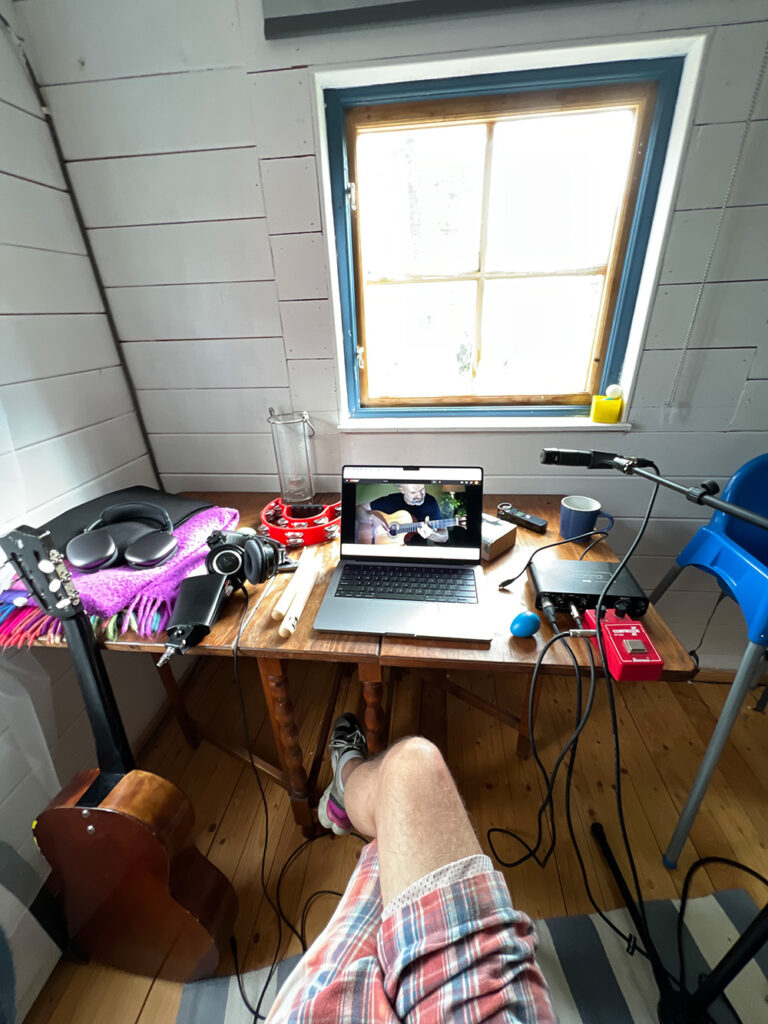
Lastly, I think probably like 60% of the tape was recorded in El Sereno at my friend Garrett’s house on a ZOOM recorder and in his home studio. I put it all together and was like, “Yeah, this is good enough” because this tape series is more of like an in-between, journal kind of thing. That’s how I see it. It’s a way for me to get a part of my process out there into the world without having to think too hard about it. It’s also meant to be a physical relic, like a diary or journal, so it’s not on DSPs or the Internet or anything, just private press.
I hear a lot of different guitar techniques on this material. It feels very connected to the music you play on your NTS show: post-rock, noise, indie rock, folk, and American primitive music. Can you talk about some of the techniques, tunings, pedals, etc. used on this tape?
On the Archipelago recordings, I used this old ass nylon string guitar that I found in the garbage room of our apartment building when I was twelve. I had actually taped chopsticks to that guitar to raise the strings so I could play slide. It was meant to be temporary, but they stayed on for ten years. Later, I went to a luthier to show that guitar some love, and he was like, “This is a guitar you would buy at the grocery store in Eastern Berlin.” It’s one of those Walmart guitars, but it’s actually really well made. It has this small tone, which I really enjoy. It’s like a woody kind of sound. Anyway, I installed a pickup in that guitar and then I played it through an ‘80s Ibanez sustain pedal. I don’t really know what sustained pedals do, but I plugged the guitar into the pedal and then directly into my sound card, like stereo split, which is probably a really bad thing to do. Then I just played these tones and I’d mess with the pickup volume and the sustain to get these swelling sounds.
Also, I’m a huge fan of John Fahey and Derek Bailey, so a lot of the tape is just trying to play like that. It sounds like me trying to be a savant on the guitar, but fucking up. I’ll play it off and be like, well, that was my intention. I got into Derek Bailey like five years ago and it opened up this new way of relating to the guitar, in the same way that Fahey did for me. I realized the guitar can be this dissonant, weird, fully functioning piece of machinery rather than just a musical instrument. That approach has kind of informed, more or less, both of these tapes, and it’s something I’m still exploring and trying to figure out how to introduce into more of my songwriting.
It sounds like you’re very much a student of the guitar. What are some songs that you’ve learned recently?
Two years ago, I tried to learn “Sandman” by Chet Atkins. It’s impossible to play. My shit was all stretched out. I was really struggling. The whole house in Vacaville was like, “Shut the fuck up, Baba. We’re sick of hearing that over and over again.” There’s also this Doc Watson song called “Deep River Blues.” So yeah – I’ll find these songs, and I’ll just try to learn them. I don’t know, that’s the thing with guitar. You have to keep on doing it because you’ll just be shit if you don’t play. I like the challenge. I’m kind of autistic in that way. I love the repetition and getting better, and that’s a really cool thing to me. I enjoy learning new stuff.
What about modern guitarists?
Modern guitar is in this weird place where all these kids who grew up taking adderall, watching anime, and listening to metal are making this really weird music now. It’s super unapproachable. It’s like the Super Saiyan of guitar – this weird amalgamation of speed and ferocity. I’m trying to think, who do I actually like… Oh, you know who I really like as a guitarist? Kurt Vile. He’s the man. He’s so good. The record he released last year (watch my moves) was one of my most listened to records.
Also, there’s this artist named Sierra Ferrell. She makes country and western music, like modern country. She’s put out some bangers. Her flat picking style is unbelievable, and her voice is crazy. Her songwriting capabilities are also pretty wild. So I’ve been into what she’s been doing. Then there’s Charley Crockett, this other country dude. He put out this record in 2019 called The Valley. People say it’s retro or nostalgic, but I don’t look at things like that. The songwriting is so good and his voice is amazing. His voice control is wild, but his guitar playing is approachable. It’s not anything crazy, but it’s really soulful. Then, of course, Jim O’Rourke. You got to fucking give it up to Jim. He’s been making great music for over 25 years across the board from making weird noise music, to recording for Fahey when his fingers were hurting. He’s a fucking legend.
Any other influences and inspirations we’re missing here?
Well, it’d be remiss not to mention Lou Reed, because he’s just the coolest guy. Homie was a tai chi master… Yeah, Lou is huge for me. I’d say I also come from the Bright Eyes/Conor Oberst thing because that was my fucking shit when I was a kid. But there’s so much. I find new shit every day. I’ve recently been digging through Internet Archive and I’ve been able to find recordings of some random dude uploading himself trying to learn how to sing in 1985… Stuff like that is inspiring to me. Early Actress stuff is still super empowering. Omar S. I think Inga Copeland’s recent record is huge, like the cut up thing. I heard that and was super inspired.
Lastly, I wanted to mention the live room recording on the tape that’s from a party in LA where you played an all reggae set. What’s that about?
I guess it’s kind of the same thing I was saying about journaling. It’s a field recording, but it’s hyper specific to that context. I used to have this microcassette tape recorder. When I went to ballet school in Sweden, if I was injured or not partaking in class, I’d have to sit and just watch. I started recording class on this micro cassette recorder. Somehow, there’s not a single photo from that time of my life. I was going to the Royal Swedish Ballet School, and there’s no photo evidence. I was thinking about all that, and then I found the micro cassette one day and I have the sound of a whole class, like a 45 minute recording. That, to me, was super thrilling and so visceral. All these memories came back to me. It was like my ratatouille moment. I was so stoked.
I got this new tape recorder from Teenage Engineering. So I’ve started to do that, just like recording for myself. If I’m out having a few drinks with friends, I’ll maybe record us doing that. Not specifically to do anything with it or for any nefarious reason, but it’s just cool to have that as a memory. So that’s kind of why I wanted to introduce the (Third Place) party recording because it’s part of that time period of making the music on the tape.
Revisit Baba Stiltz’s Favorite Guitar Albums: https://insheepsclothinghifi.com/baba-stiltz-favorite-guitar-albums/




